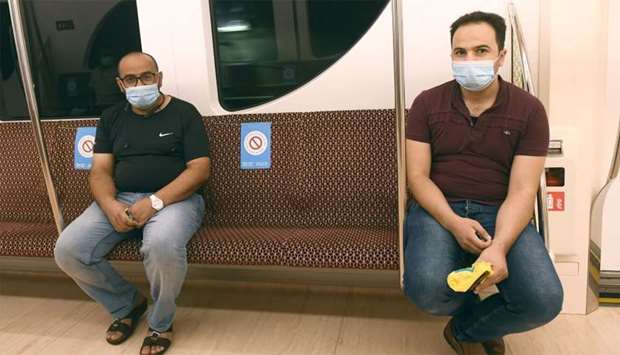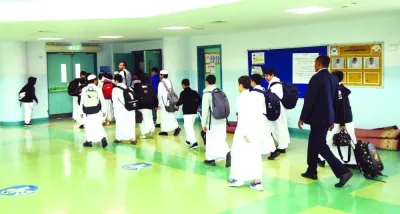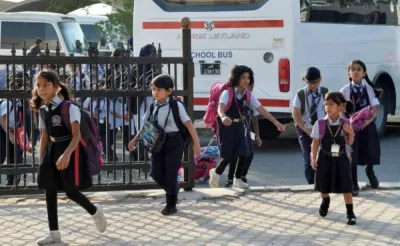Thousands of students returned to school for the new academic year on Tuesday after a long break necessitated by the Covid-19 restrictions, even as many others stayed at home as part of the blended learning system put in place for this term.
Doha Metro and public bus services also resumed operations on Tuesday while food courts reopened at malls, all with limited capacity on the first day of the Fourth Phase of the lifting of Covid-19 curbs.
According to the blended learning system, students have to attend classes in school from one to three times a week, with a maximum 30% of the total number of students allowed on a single school day. In order to maintain the necessary health conditions and social distancing, schools have been required to split students at any level into groups of a maximum of 15.
Also, a minimum distance of 1.5m has to be maintained between each student on all sides.
These and a host of other precautionary measures have been put in place to protect children from Covid-19 infection. These include checking the body temperature of students before letting them in, general social distancing on campus, wearing face masks, provision of hand sanitisers and other measures.
The Ministry of Education and Higher Education (MoEHE) and Ministry of Public Health (MoPH) have reiterated the need for students to follow all precautionary measures in schools and at homes, and stressed the important role played by all concerned in this - children, their parents and the school staff.
Tuesday, children were seen undergoing body temperature checks while entering the school, and maintaining social distancing in classrooms and elsewhere on campus and the staff explaining the dos and don'ts to children, among the implementation of other measures.
The authorities had earlier assured that the precautionary and preventive measures put in place will make the return to school safe. Technical teams will regulate and monitor the entry and exit of students to avoid any potential crowding and maintain adequate physical distance among them during these procedures.
The first three days of school reopening are dedicated to raising the students’ awareness on Covid-19 precautionary and preventive measures and the need to follow them strictly.
The MoEHE is implementing the blended learning system during the first term of the 2020/2021 school year in government and private schools, higher education institutes and kindergartens, across all educational stages.
More than 340,000 students are expected to attend public and private schools in this academic year.
HE the Minister of Education and Higher Education Dr Mohamed Abdul Wahed Ali al-Hammadi had on Monday stressed that the success of blended learning depends on many factors, most prominently the home-school partnership.
Meanwhile, on Tuesday also saw the resumption of Doha Metro and public transit (bus) services at 30% of their capacity. Qatar Rail and Mowasalat have taken the necessary steps to ensure that all precautionary measures are followed by both staff and users.
Doha Metro has imposed stringent measures to prevent the spread of Covid-19 such as requiring Metro passengers to show the 'green' QR code on the Ehteraz app, wear face masks at all times and adhere to social distancing practices and other protocols such as thermal scanning.
Mowasalat (Karwa) also started providing public and school transport services from Tuesday, with all preventive measures put in place to ensure safe transportation on public and school buses.
The fourth phase has been divided into two stages, with the first one beginning on Tuesday and the next one scheduled to start in the third week of September, as was announced by the Supreme Committee for Crisis Management recently.
The first stage of Phase 4 includes the reopening of all mosques in the country to perform daily and Friday prayers.
Normal working hours will continue at malls while keeping the capacity to 50%, while food courts in malls will open at 30% of their capacity. Also, children are now allowed to enter malls.
Restaurants with a Qatar Clean programme certificate can receive customers up to 100% of their capacity. Eateries that do not have a Qatar Clean certificate can only receive customers up to a maximum of 30% of their premises’ capacity.
Private health clinics are now allowed to resume work at full capacity.
Cleaning and hospitality service companies are allowed to resume work in workplaces and homes, provided the staff does not exceed 30% of the total operating capacity.
This phase includes the opening of cinemas and theatres at 15% of their capacity, and only people who are 18 years and above are allowed entry.



